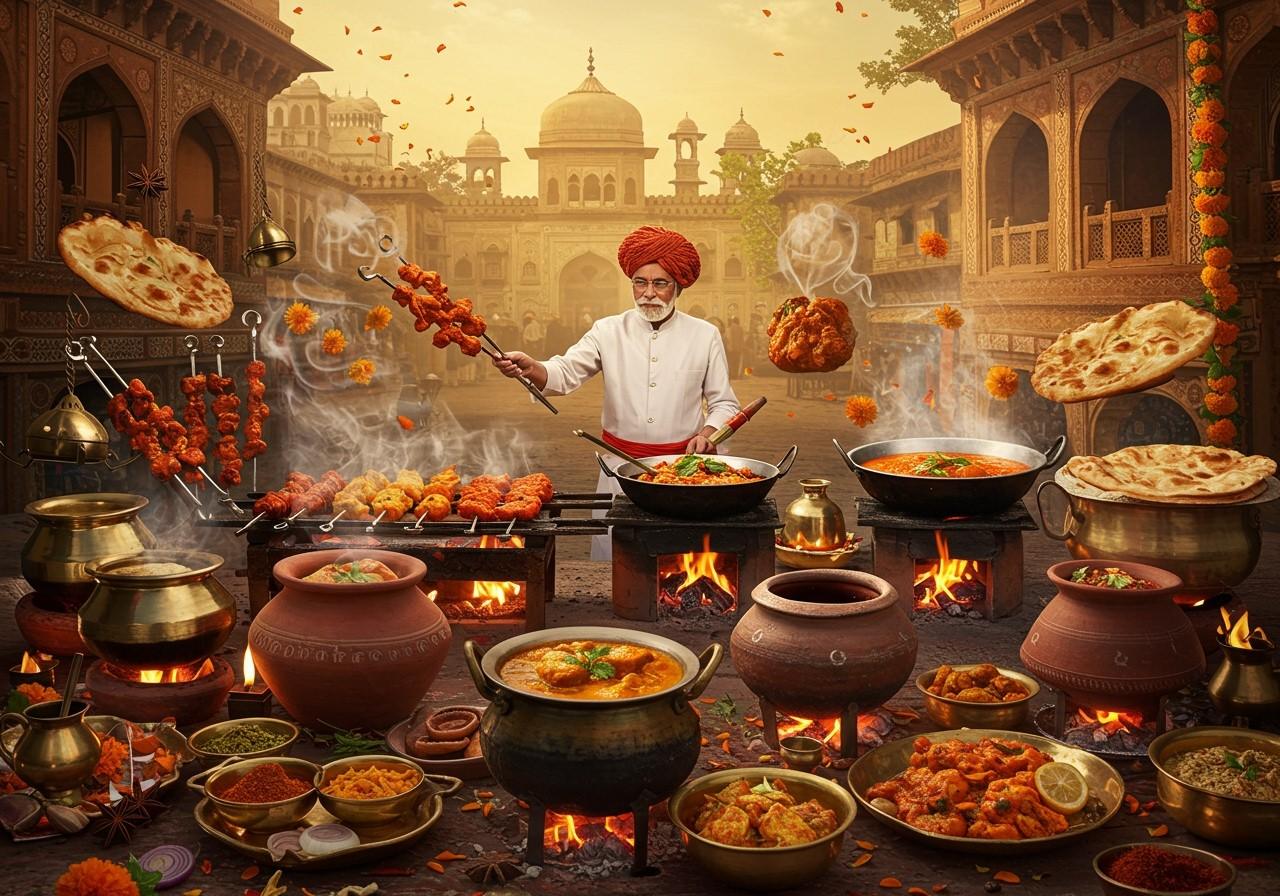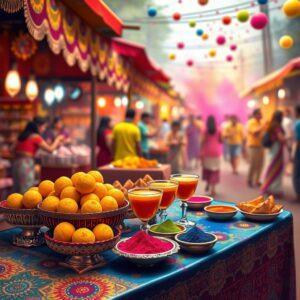
The Grand Trunk Road (GT Road), one of Asia’s oldest and longest major roads, stretches over 2,500 km from Bangladesh to Afghanistan. This ancient trade route has not only connected distant regions but also fostered a unique blend of culinary traditions. Discover the rich tapestry of flavors, spices, and culinary heritage that have evolved along this iconic road over centuries.
The Historical Significance of the Grand Trunk Road
Built by Chandragupta Maurya in the 3rd century BCE and later expanded by Sher Shah Suri in the 16th century, GT Road served as a vital trade and communication artery. It facilitated cultural and culinary exchanges between diverse regions, shaping the culinary landscape we know today. Ancient empires, invading armies, and migrating communities have all left their mark on the food traditions along this historic route.
Connecting Cuisines: Regional Delicacies Along GT Road
Explore the diverse culinary offerings from the various regions connected by GT Road:
- Bengal: Known for its delicate fish curries, sweets like rasgulla, and the subtle use of spices like mustard and poppy seeds. Bengali cuisine offers a unique blend of sweet and savory flavors.
- Bihar: Experience the earthy taste of litti chokha, a roasted wheat ball filled with spiced sattu, and sattu paratha, a flatbread made with roasted gram flour. These dishes represent the rustic and wholesome flavors of Bihar.
- Uttar Pradesh: Savor robust and spicy dishes such as kebabs, biryanis, and korma. The cuisine of Uttar Pradesh is influenced by Mughal traditions and is known for its rich gravies and aromatic spices.
- Punjab: Indulge in rich, buttery dishes like sarson da saag (mustard greens) and makki di roti (cornbread), a staple combination. Punjabi cuisine is celebrated for its hearty flavors and generous use of dairy products.
- Pakistan: Explore the bold flavors of Lahori cuisine, featuring nihari (slow-cooked meat stew) and halwa puri (sweet semolina pudding with fried bread). Pakistani cuisine offers a diverse range of flavors and textures.
- Afghanistan: Enjoy kebabs and pilafs, often seasoned with aromatic spices like saffron and cumin. Afghan cuisine reflects the country’s history and cultural influences.
Street food culture thrives along GT Road, from the tangy chaat in Delhi to the crispy pakoras in Lahore, offering a quick and delicious glimpse into local flavors.
Famous Food Stops on Grand Trunk Road
Some prominent food destinations along GT Road include:
- Kesar Da Dhaba in Amritsar: Known for its authentic Punjabi cuisine, particularly its dal makhani and Amritsari kulcha.
- Karim’s in Delhi: Famous for Mughlai dishes like biryani, kebabs, and rich curries, a legacy of the Mughal era.
- Sita Ram Diwan Chand in Delhi: Popular for its chole bhature, a spicy chickpea curry served with deep-fried bread.
- Puran Singh Da Dhaba in Ambala: Serves hearty meals to travelers, offering a taste of traditional Punjabi cuisine.
- Gawalmandi in Lahore: Renowned for its diverse street food, offering a vibrant culinary experience.
The Grand Trunk Road Food Festival celebrates this culinary heritage annually in various locations. For example, The Jehan Numa Palace in Bhopal hosted a festival starting June 21, 2019, showcasing the diverse flavors of the region. Another festival took place at The Fern, Goregaon from June 14th to 23rd, 2024, offering a sensory journey with dishes from various cities along the route. These festivals aim to capture the cultural and culinary specialties of every city along this historic road.
Culinary Techniques and Ingredients
Traditional cooking techniques and ingredients that define GT Road cuisine include:
- Tandoors: Clay ovens used for baking breads like naan and roti and grilling meats, imparting a smoky flavor.
- Slow-cooking methods like dum pukht: Used for biryanis and stews, allowing the flavors to meld and deepen over time. This technique creates tender and flavorful dishes.
- Extensive use of spices: Cardamom, cumin, coriander, and turmeric are just a few of the spices that add depth and complexity to GT Road cuisine.
- Dairy products: Ghee, yogurt, and paneer add richness to dishes, contributing to the creamy textures and flavors.
The use of seasonal and locally sourced ingredients reflects the agricultural abundance of the regions along GT Road. Persian and Central Asian culinary techniques also influence the cuisine of the subcontinent, adding to its diverse character.
How Poojn.in Enhances Your Grand Trunk Road Culinary Experience
Poojn.in offers a curated selection of items that connect you to the authentic flavors and traditions of Grand Trunk Road cuisine. Our platform provides:
- Pure copper and brass utensils: Ideal for preparing traditional dishes like Dal Makhani and Amritsari Kulcha, enhancing the flavors and preserving the authenticity of the cooking process. Explore our collection of copper and brass utensils.
- Authentic spice boxes (masala dabba): Made from quality materials to store your essential Grand Trunk Road spices, keeping them fresh and organized. Find the perfect masala dabba for your kitchen.
- Traditional cookware like kadai and tawa: Perfect for making classic dishes from Punjab to Bengal, ensuring authentic cooking techniques and flavors. Discover our range of traditional cookware.
- Pure silver and brass water vessels: Complement the traditional dining experience, adding a touch of elegance and cultural significance to your meals.
- Eco-friendly disposable plates made from leaves (pattal): Perfect for serving festive meals, adding a traditional touch while being environmentally conscious.
Visit Poojn.in or download our app to explore our complete range of traditional kitchen and dining items. We deliver across India, bringing authentic cookware and dining essentials to your doorstep. Our products help maintain traditional cooking methods while ensuring the authentic taste of Grand Trunk Road cuisine remains preserved.
Conclusion: Celebrating the Rich Culinary Heritage of Grand Trunk Road
The Grand Trunk Road is more than just a historic route; it’s a vibrant tapestry of flavors and traditions that have evolved over centuries. Each region along the road contributes its unique culinary heritage, creating a rich and diverse food culture. From the delicate fish curries of Bengal to the robust kebabs of Uttar Pradesh, the buttery dishes of Punjab, and the bold flavors of Pakistan and Afghanistan, GT Road offers a feast for the senses. Exploring the food stops and enjoying the annual food festivals along GT Road allows us to experience the deep connection between history, culture, and cuisine.
By understanding and appreciating the culinary diversity of GT Road, we honor the traditions and celebrate the shared heritage that connects us all. Whether you are a seasoned traveler or a food enthusiast, the Grand Trunk Road beckons with the promise of an unforgettable gastronomic adventure. For more information on Hindu culture and traditions, explore our related articles on Karma in Hinduism and Hindu Gods and Goddesses.


